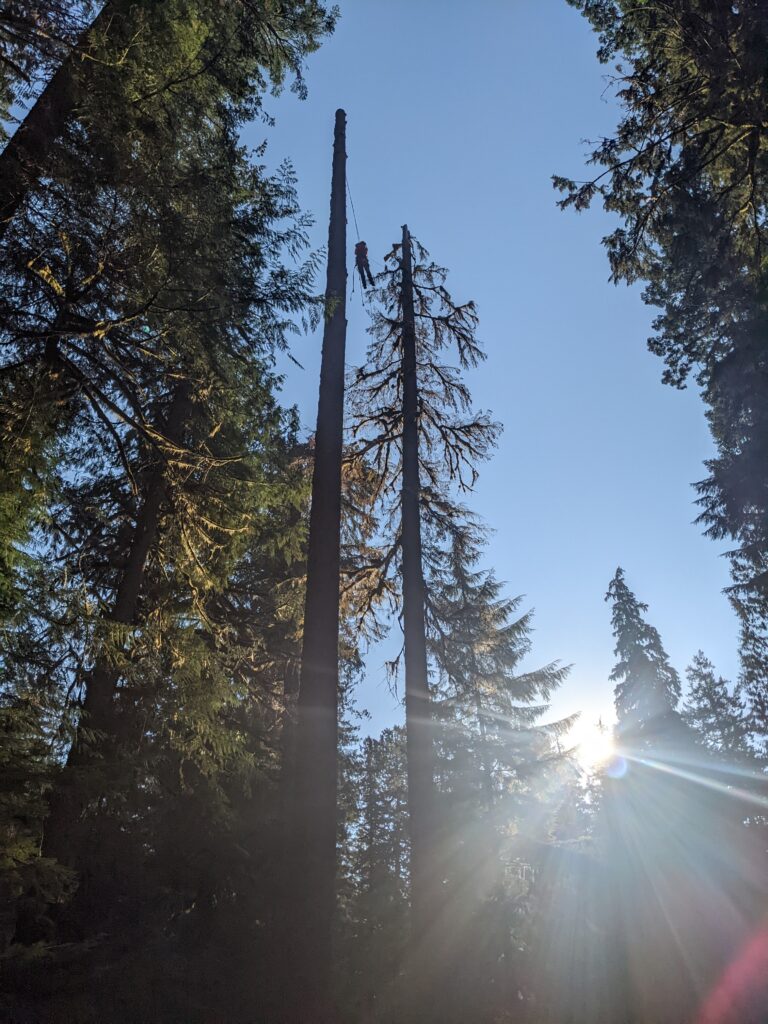
Industry News
News
B.C. extends old-growth logging deferral in endangered spotted owl habitat
March 6, 2023 By B.C. Ministry of Forests
 Old-growth trees. Photo by Brendan Flanagan.
Old-growth trees. Photo by Brendan Flanagan. As part of an integrated strategy to re-establish a sustained breeding population in some of British Columbia’s old-growth forests, the province has extended an old-growth logging deferral in the Spuzzum and Utzilus watersheds in the Fraser Canyon that spans 32,671 hectares. The deferrals have been extended for another two years, until Feb. 28, 2025.
This important step is to support the recovery of endangered spotted owls while promoting biodiversity and accelerating the protection of old-growth forests.
Extending these deferrals supports the long-term recovery of this species. More than 280,000 hectares of spotted owl habitat have been protected as part of an integrated strategy that safeguards 100,000 hectares of long-term owl habitat, in addition to the 180,000 hectares of protected habitat within provincial parks, Greater Vancouver watersheds, ecological reserves and regional parks.
Taken together, this is an area large enough to maintain a self-sustaining population of 125 spotted owl breeding pairs.
“Our forests are foundational to British Columbia,” said Bruce Ralston, Minister of Forests. “These deferrals allow us to protect spotted owl territory as we launch new measures to protect more old-growth forests.”
There are three known spotted owls in the wild in B.C., including two birds that were released in August 2022 from the Northern Spotted Owl Breeding Program facility in Langley. This was the first such release into the wild of these rare and endangered birds anywhere in the world.
There are 31 birds at the breeding facility. The long-term goal is to expand the spotted owl breeding program and release as many as 20 spotted owls into the wild each year. Biologists continue to monitor the released owls to determine the best path to ensure the wild population recovers.
“Our government is committed to working with First Nations and our federal partners to aid the recovery of this iconic species,” said Nathan Cullen, Minister of Water, Land and Resource Stewardship. “These deferrals are an important component of a complex process that will allow us to learn as much as possible to support the reintegration of the spotted owl into its habitat.”
Deferrals on commercial logging in spotted owl habitat improve protection and recovery efforts, and help enhance biodiversity in British Columbia. There has been no active commercial tree harvesting in the two Fraser Valley watersheds since the deferrals came into effect.
Deferrals have been implemented on approximately 2.1 million hectares of old-growth forests to prevent biodiversity loss. The B.C. government recently launched new measures to protect more old growth by fast-tracking innovation and co-developing new local plans with First Nations to better care for B.C.’s forests. These plans will prevent harvesting in old-growth forests important for ecosystem health, biodiversity, clean water, carbon storage and Indigenous values. They will also provide greater certainty about the areas where sustainable harvesting can occur to support jobs and investment.
The province will continue to support and implement recovery actions for species at risk. In 2022, the Ministry of Water, Land and Resource Stewardship was created to oversee integrated land and natural resource management, including setting objectives for land and marine environments, managing the cumulative effects of human activities, advancing reconciliation with Indigenous Peoples, and fostering environmental sustainability and economic growth.
Print this page